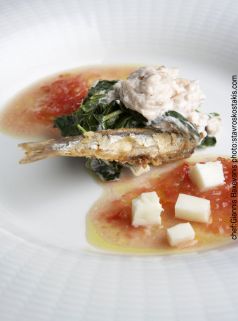Greek Gastronomy
Gastronomy is, of course, a Greek word. Ironically, the history of the cuisine evinces a decided lack of gastronomical Greek dishes, save for the periods of antiquity, the Byzantine era, and from the last years of the 20th centure, when Greek cuisine and Greek gastronomy experienced a radical transformation.
Until very recently, Greek cuisine was home-based. Restaurants fell into several categories: grill houses, fish and seafood places, certain specialty eateries (tripe houses, soup places, souvlaki joints, etc.) and the ever-popular family-run neighborhood taverna, where traditional Greek cuisine was and is the mainstay. In the late 1980s and 1990s, a generation of young, urban Greeks returned from study and life abroad, where they had acquired a more international and sophisticated palate, which translated into demand for cosmopolitan cuisine. In those early decades, a new generation of chefs also emerged who saw their profession as a career and not a choice of last resort; the open market of the EU brought a deluge of new food products to the Greek supermarket, inspiring chefs to experiment. In the 1990s, contemporary Greek cuisine was characterized by an “anything-goes” spirit. Fusion –and much confusion– was the word of the day in Greek gastronomy.



